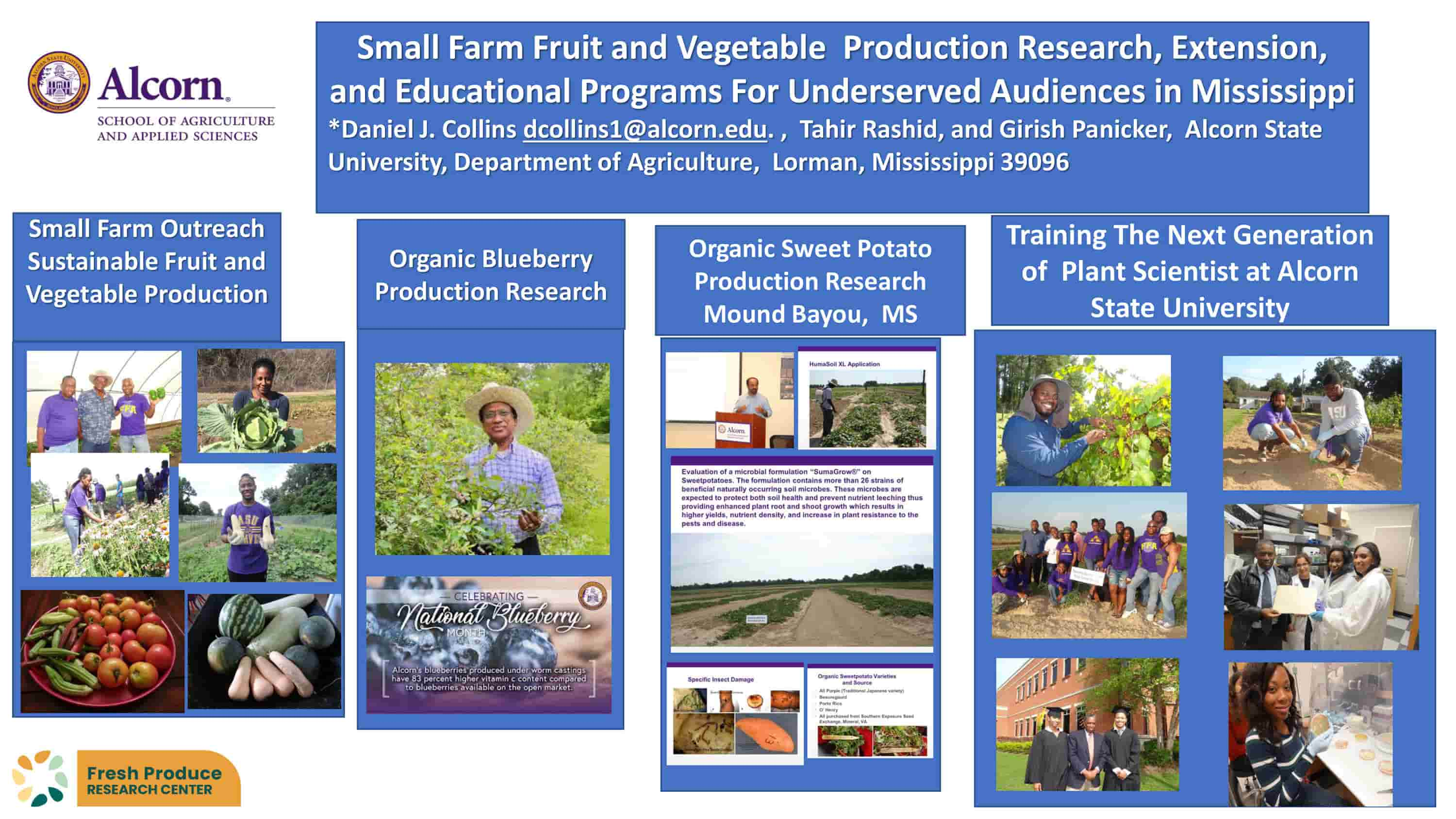What is the IFPA Fresh Produce Research Center?
Solutions to challenges facing the fresh produce industry have to be based on solid scientific data. Government investment in industry-relevant research on climate change adaptation, sustainability solutions, nutrition, genetics and crop production continues to be a small fraction of what is allocated to support biomedical and other industries in most developed countries. Guided by an Advisory Committee, The Fresh Produce Research Center will be the clearing house for identifying research needs, catalyzing connections among researchers and the industry, advocating and following through with the global research enterprise.
What is the purpose of the Fresh Produce Research Center?
The Fresh Produce Research Center will connect academia with industry to ensure federal agencies prioritize investment in fresh produce research to successfully leverage research needs of the global fresh produce industry. The Fresh Produce Research Center will not fund individual projects, nor will it fund-raise.
What are the Benefits to Participants in the IFPA Fresh Produce Research Center?
Researchers associated with The Fresh Produce Research Center will benefit from the industry feedback and connections. Advisory Committee members will have an opportunity to guide research relevant to the industry and have preferential consideration to work directly with the researchers as pilot and trial participants.
What are the Benefits to IFPA and Membership?
The cost of R&D, and especially the cost research is expensive. IFPA's Fresh Produce Research Center will work to help
- minimize the financial burden through identifying grants and fundamental applied research with immediate and anticipated benefits to the fresh produce industry
- provide research briefs and digests, tools and guides to make the research more consumable.
We’ve already begun down this path, with USDA-funded projects currently underway at member and partner organizations due to our leadership on the Food and Ag Climate Alliance.
Research Posters

Table to Farm: A Collaborative Approach to Address
Addressing climatic challenges through regenerative agriculture to improve human health by examining carious farm-to-table approaches, climate resilience and bioactives from field to human intervention trails. This research is one of the many studies that can be used by IFPA and our members to support the work on Climate Smart Agriculture according to Dr. Max Teplitski.

IPM and Regenerative Agriculture
Integrated Pest Management research looking at approaches to use reduce-risk insecticides and augment natural enemies to decrease invasive pest for crop production.

Monitoring and Management Strategies for Cucumber Moth
The cucumber moth is a serious pest to cucurbit crops in Florida, Australia, Africa, and England. This study monitors the infestation level to develop monitoring systems for this pest.

Implementation of Integrated Pest Management Strategies in the Specialty Crops
Research conducted in the Florida Panhandle to provide critical solutions to enable producers to protect and/or conserve plant, animal, and human resources through implementation of the National IPM Roadmap. This research is one of the many studies that can be used by IFPA and our members to support the work on Climate Smart Agriculture according to Dr. Max Teplitski.

Growing the Future of Florida Agriculture
Research at the UF/IFAS Center for Sustainable & Organic Food Systems is looking at ways to preserve resources, build capacity, bring production closer to the consumer, and extend seasons for crop production.

Shelf-Life Extension of Cherry Tomatoes Using Novel Sustainable Packaging
The aim of this study was to use orange juice processing waste to develop a sustainable package that can extend the shelf life of cherry tomatoes while contributing to agricultural waste management. The novel package consisted of an orange peel powder Incorporated poly(lactic acid) (PLA) tray wrapped with a microperforated PLA film. The results show that waste from orange juicing can be used to create sustainable packaging that can extend the shelf life of cherry tomatoes. The novel package will also work for other commodities that benefit from a modified atmosphere.

Identification of packaging barriers to Exporting Specialty crops to the European Union
The U.S. is a significant exporter of specialty crops to the EU and is directly affected by the new packaging regulatory regime. Sustainable packaging regulations are being established in the EU legislation without sufficient awareness of the technical challenges and the time needed to identify and implement new packaging solutions. If U.S. exporters are unaware of these emerging regulations restricting single-use packaging for specialty crops, they risk having a shipment detained at port for non-compliance. If the exporters cannot implement new packaging requirements, they will lose access to lucrative European markets. This project aims to create a robust assessment of the packaging systems to export specialty crops to the European Union and develop a methodology to determine the risk of non-compliance for a packaging system to an export market to hinder the trade of specialty crops.

Assessment of Carbon and Climate Smart Practices Through Field Data, Sensors, and AI Modeling
Dr. Grunwald and her research team have expertise in soil carbon modeling, proximal soil sensing (visible-near-infrared and mid-infrared spectroscopy), remote sensing, pedometrics, and artificial intelligence (AI) machine learning and deep learning applications to assess soil health and ecosystem functions in various agricultural and forest ecosystems. This research is one of the many studies that can be used by IFPA and our members to support the work on Climate Smart Agriculture according to Dr. Max Teplitski.

Small Farm Fruit and Vegetable Production Research, Extension and Educational Programs for Underserved Audiences in Mississippi
Small farmers in the southern region of the U.S. face serious challenges in managing plant diseases, weeds, and insects in crops and forest ecosystems. Yield losses due to sub-tropical climate conditions, weather extremes (e.g., hurricanes, drought, tornados), and pest outbreaks have been substantial. Socially disadvantaged small farmers are more vulnerable to losses due to lack of Integrated Pest Management (IPM) knowledge, limited resources, and challenging circumstances for managing plant pests.

Sustainable Nutrient Management Systems
The Sustainable Nutrient Management Systems lab at the University of Florida conducts research on nutrient cycling and soil health in a variety of agroecosystems, with a specific focus on carbon, nitrogen and phosphorus cycling in vegetable production systems of the Southeastern US. Our research focuses on individual practices that can improve the sustainability of nutrient management (cover crops, hybrid fertilization with amendments and fertilizers, greater use of nitrogen fixers), broader system shifts (organic systems, regenerative agriculture, livestock integration), and the development and application of methods and indicators to study nutrient transfer to vegetable crops and soil health in the Southeast US.

Improvement of Shelf-Life and Nutrition Values of Fruits and Vegetables Using an Edible Coating
The waste of food is especially prominent in perishable fruits and vegetables due to the short shelf life of only a few days after reaching retailers, such as strawberries. We developed a biodegradable and biocompatible trans-resveratrol (R) encapsulated nanoparticle delivery system (RNPs) and embedded it into chitosan (CS) matrix to form a dip-coating solution. The RNPs-CS was performed on strawberries and formed a multifunctional edible coating that can diminish dehydration, prevent nutrient loss, inhibit microbe growth, increase nutraceutical value, preserve strawberry quality, and extend strawberries’ shelf life.

Development of Innovative Tools for Understanding Postharvest Senescence
Through using genetics, machine learning, and multi-omics this reseach explores how genes integrate with environmental cues and interact with pathways for plant growth. The goal is to improve postharvest shelf-life and food quality.

Dendritic Identifiers: Connecting Items in Agri-food to the Cloud
The goal of this project is to protect the US food supply from the scourges of contamination, waste, and fraud through a low cost, highly usable and secure tracing methodology that is compatible with evolving approaches to information handling such as blockchain. Our “Dendritic Identifier” solution derives from a technology based on dendrites – exquisite tree-like patterns that are very easy to form using inexpensive materials and mass manufacturing techniques, allowing the supply chain to have its own unique trusted identifier that connects it to its digital presence in the Cloud.

Upcycling: Waste to Delicacy
Upcycled ingredients and food products elevate food that would otherwise be wasted to higher uses. This upcycling provides tangible benefits to the environment and society, while providing producers ROI.
Fresh Produce Advisory Committee

Scott Dray
Sr. Director Global Produce Sourcing
Walmart

Jenny Maloney
Global-Americas Strategic Accounts Manager
Bayer

Marta Bapista
VP Applied Science
Driscoll's

CSO
Fresh Del Monte

Martha Zwonitzer
Director of Agronomy
Grimmway

Megan Stoffer
Manager of Sustainability
Sysco

Rafael Marino
National Accounts Director
The Queen's Bouquet Network

Martha Mendez
Managing Director
Florverde

Jenny Conner Nelms
Senior Policy Advisor for Agriculture North America Policy & Government Relations

Ladonna Thornton
Assistant Professor
Auburn University

Toine Timmermans
Program Manager Sustainable Food Chains
Wageningen University & Research
